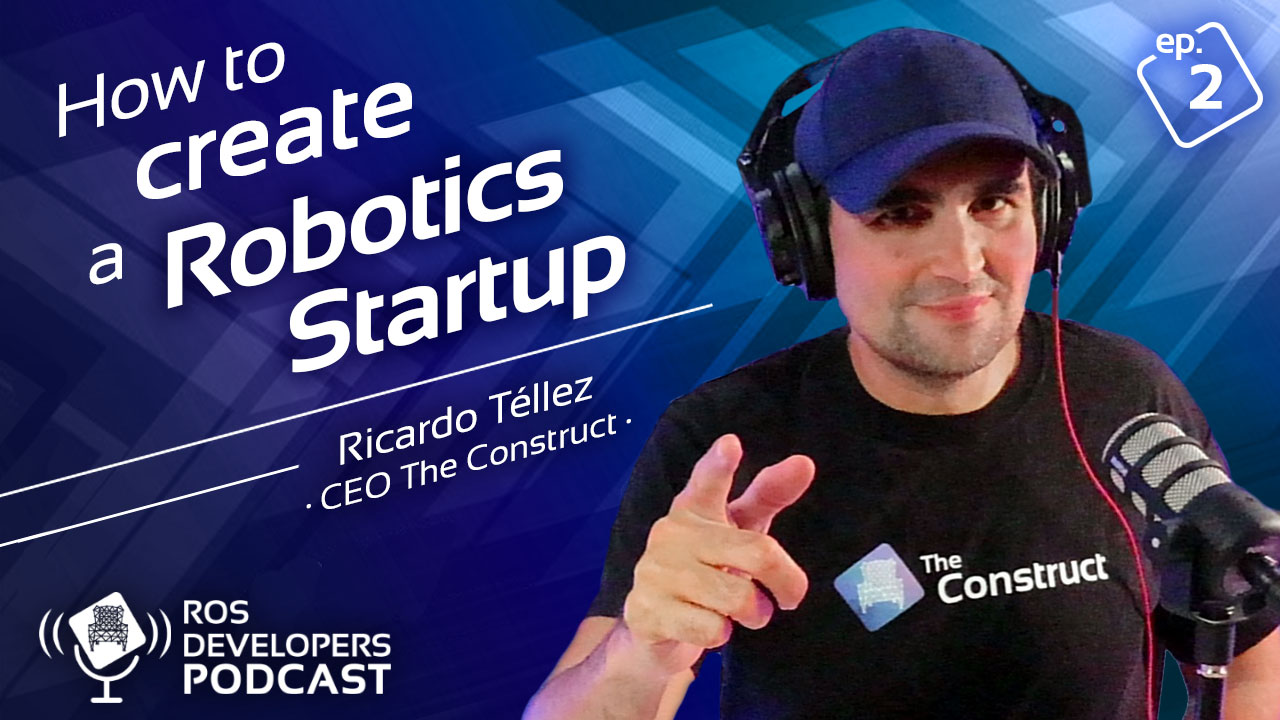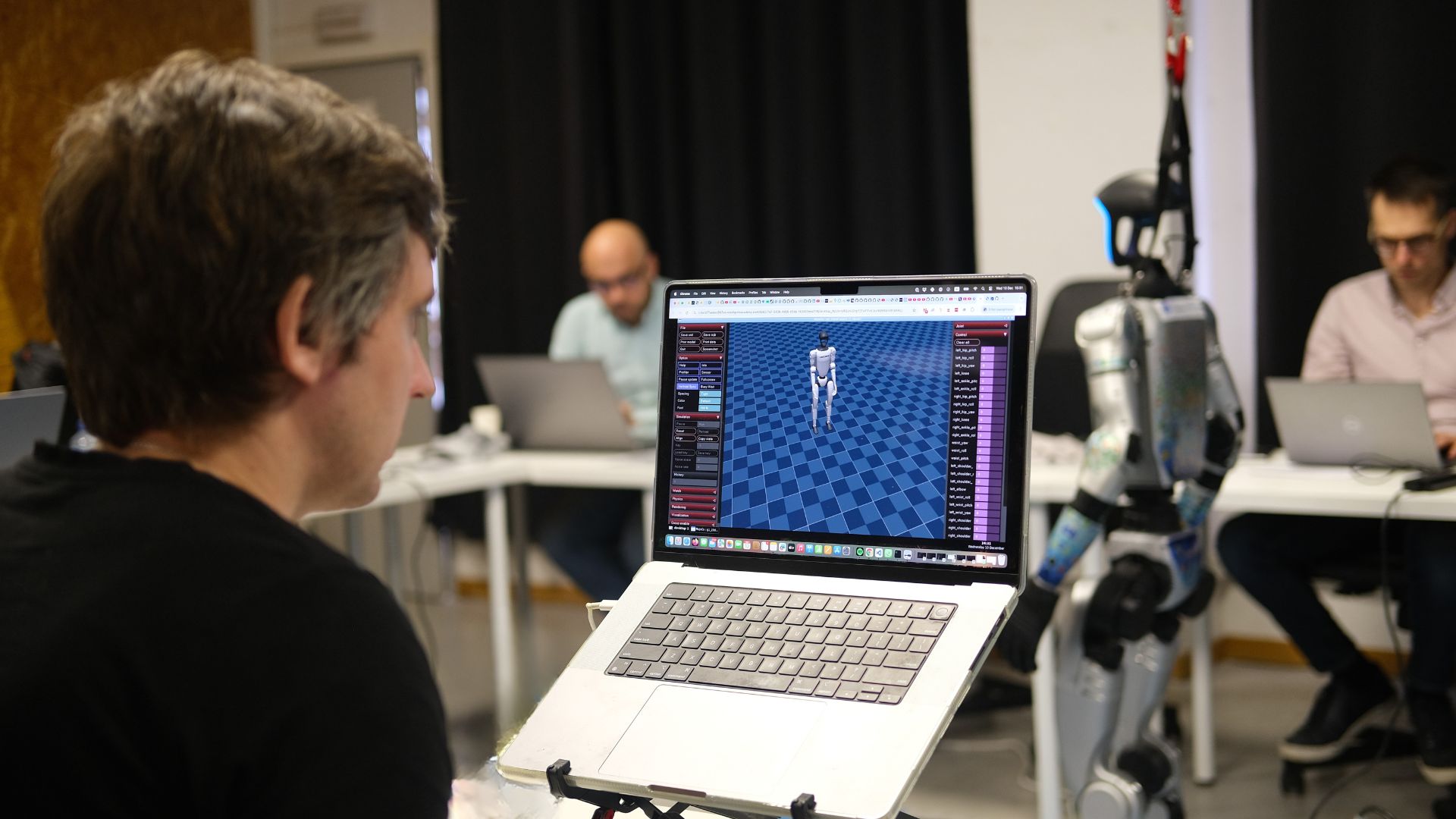This episode is about understanding why you can’t build your startup alone, and some criteria to properly select your co-founders.
In this podcast series of episodes we are going to explain how to create a robotics startup step by step.
We are going to learn how to select your co-founders, your team, how to look for investors, how to test your ideas, how to get customers, how to reach your market, how to build your product… Starting from zero, how to build a successful robotics startup.
I’m Ricardo Tellez, CEO and co-founder of The Construct startup, a robotics startup at which we deliver the best learning experience to become a ROS Developer, that is, to learn how to program robots with ROS.
Our company is already 6 years long, we are a team of 15 people working around the world. We have more than 100.000 students, and tens of Universities around the world use our online academy to provide the teaching environment to their students.
We have bootstrapped our startup, but we also (unsuccessfully) tried getting investors. We have done a few pivots and finally ended at the point that we are right now.
With all this experience, I’m going to teach you how to build your own startup. And we are going to go through the process by creating ourselves another startup, so you can see in the path how to create your own. So you are going to witness the creation of such robotics startup.
Get Your Team Tight
To create your startup, you need three things:
- An idea or the product
- A team to realize your idea
- A small amount of money to start implementation
We covered this first point in Episode 1. Episode 2 deals with the second point. Episode 3 will deal with getting the money to start.
3 reasons that Startups Fail
- No market need. That was covered in Episode 1 and will be addressed in more detail in future episodes.
- You ran out of cash. This Is another version of the first problem – no market need.
- Not the right team. Yeah!
You will need a team that helps and supports you. You cannot do the startup by yourself. I understand how tempting is to do the startup by yourself, especially for engineers like us who want to work on our project and forget about the rest of the world.
You Cannot Do the Startup by Yourself
Thinking about doing the startup by yourself is a recipe for disaster, for several reasons:
- You cannot handle all that is required. Again, I know how you feel about that because I also felt that. We are engineers, after all. I understand you, my friend. However, you need to be realistic if you want your startup to succeed. And here is the reality: you cannot handle everything required to create the first prototype. Yes, I know you believe you can, but you cannot. I’m not telling you that, given an infinite amount of time and resources, you couldn’t do it. I’m not telling you that. I know you are intelligent enough to do it, but not in the amount of time required to have a good product ready to be sold. It doesn’t matter if it is software or hardware. The large number of tasks that you will need to do is so big that the amount of time required will increase, and you will be unable to deliver.
- You need other people to tell you that your idea is stupid. If you are on your own, it is more likely that you will think that all your ideas are great and start chasing all of them. So you need somebody with other opinions to act as a filter.
- You are not giving the appearance of professionalism. It looks like you are just doing your hobby. If you need investors later, they will likely not take you seriously because solopreneurs don’t look serious. Instead, they look like they are just playing. They will not trust that you can keep building the product to make them rich. Also, a single person indicates that you have problems managing other people, so this problem will appear later when you need to scale your business.
- You are not preparing yourself for what is coming. This is by far the most important point. If you want to build a startup, you will need a team in the short term, like it or not. You will need to learn to work with other people, synchronize with them, negotiate, make arrangements, solve conflicts, make people happy on the job, and all that. Yes, I know you are thinking that you are not building a startup to do all that. Instead, you are building a startup to put a cool product in the world. Yes, that is right. But to do that, you need to do all the rest.
It is very likely that as an engineer, you don’t have those skills now. So now is the moment to start practicing. You are going to need this if you want to create a startup that grows. So you better start practicing now with a small team and then scale your learning as your company scales.
If you really hate to deal with people, manage people, make arrangements. If you really think that the only thing you want people for is to provide commands that they must execute, then think again about creating the startup. Your team is the most important part of the startup because they are what makes the delivery possible. We’ll talk in future episodes about how to hire and manage teams, and how to fire.
If you really don’t like to lead people, then don’t start the startup. You cannot manage it by yourself. You will need a team. Even if small right now, you will need some team. Then if things go as planned, you will need to hire more people.
Maybe you are thinking about going small now, but you will hire others to do the management as soon as you succeed. That is okay if you want to be managed by somebody else.
Leading a team is the most difficult job. It is more difficult than creating intelligent robots. I personally do not like to do that job, but for some reason, I’m not bad at it. Managing is one of the parts of my job that I don’t like, but I do it extremely carefully because I think it is essential to the success of our company.
Start With Co-founders
When talking about a team, I’m talking about co-founders. That means that those are the people that will create the startup with you, so you share the ownership of the company. That is different from people who work at the company for a salary. Co-founders are co-owners; workers are not. Therefore, their privileges and salaries are different (usually lower salaries for co-founders). We’ll cover how much to pay to co-founders and workers in the next episode, but basically, co-founders should be able to work for free (because they own part of the company). If you have money to spend now, you may be interested in hiring people with no ownership in the company. In that case, you should pay them a salary.
I assume you have no money to spend on salaries, so you would like to find co-founders to take the risk with you.
So what is the minimum number of co-founders you can start with?
You need to start with a minimal team. Remember that at this time, you are still not generating any money, so that you will be using your savings or taking out loans. You also do not know if the market will accept your product, so it is very likely that you will need to do a few rounds of testing before getting a product that starts generating revenue. If you are thinking about getting an investor, no investor will invest in your idea without a demonstration that your product is interesting for the market, so do not count on that money yet. You need to prove first that your product has a market. So you will be relying on your savings or loans from your family and friends (we’ll discuss this in Episode 3).
So you need a minimum amount of people. However, do not start with too many people; otherwise, your funds will deplete quickly. Also, there could be a lot of disagreements that break the team.
What is the minimum number of people necessary to get your startup running?
- I think the minimum is two people: one for getting the engineering work done and another for running the business. That is a minimum. However, if the product is very complex, you may need more engineers to build the product. For example, at The Construct, we started with one person on the business side (myself, no idea how to do it at that time) and the rest of the team developing the product (three people). That is a lot. I do not recommend so many people, but in our case, it was a success. The more people on your team, the more difficult it is to take decisions.
I think that two is the minimum. Definitely, in most cases, I don’t think you need more than one business person because the goal of the startup is to discover if your product has any traction and, if not, design the proper experiments to figure out how to change it to achieve traction.
That doesn’t mean that people will not do overlapping work. On the contrary, it is very likely that everybody will have to do marketing tasks, show demos to clients, call clients, etc.
When you select the people for your team, you will be tempted to ask your friends or family for that. That is a little bit dangerous. Being friends is one thing. Working together to make a startup succeed is another. It is not even close to working together in a third-party job.
The startup is your baby and your team’s baby. But your friends’ management style for the baby may be different to yours, especially concerning your work ethic. Startups require a lot of work. You can disagree on using one technology or another, but that will not break the team. But you cannot disagree on your company’s work ethic.
Basically, work ethics means how hard you are going to work. Any successful startup requires massive amounts of work. Expect that.
Personally, I prefer the work ethic of Elon Musk (he works a lot, an insane number of hours). But other people think that is not a proper way because you need more rest. That is okay. Each one has his vision. The problem is when you mix those together. If your partner wants the weekends free for the family, but you don’t (or vice versa), you will have a clash of opinions on a very basic point.
In startups, you will make so many errors that, in my opinion, the best strategy is to work more and more to compensate for the mistakes quickly. But, unfortunately, that is why the person who works more will feel that the other is not doing their part. This is the beginning of very deep discussions that are difficult to solve because you cannot convince the other part of your working style.
Yes, you will have to learn to work smarter, but that will not reduce the number of hours of work but include more things to do. And you need to!
In conclusion, do not select as a co-founder somebody because you like him. You may end up disliking him after a few months of pressure. Do not select that friend of yours with whom you had the most laughs when he always left studying to the last day or was copying on the exams and feels proud (unless you also did the same). Don’t select the one that thinks weekends are for resting (unless you feel the same). If you have different work ethics, you will have a lot of disagreements. It will be very difficult to handle those if you are friends or family because you cannot have a serious discussion with them without affecting your personal life.
How Do You Distribute the Jobs?
It is good that you have somebody who has studied business or has some experience on the team. If not, do not worry that much. Select the person, and that person will have to start in an express process to learn about it. This is one of the aspects you will have to master in creating a startup: you will have to be learning continuously at high speed. There will be so many things you don’t know how to do, and you will have to dedicate a lot of time to learning. We will dedicate one episode only to this.
You do not have to be the CEO if you don’t like that position. Usually, engineers prefer to act as CTO, the company’s chief technical officer. The CEO decides the direction of the company, and the CTO determines how to reach that direction technically. However, at this point in the startup, those titles don’t matter because it is too early to define well-separated works. After all, everyone will be helping.
The more skills they have, the better, but that is not mandatory. It is more important that they have the attitude to learn fast and jump into problems. The whole team will need to learn a lot quickly throughout the process, so the important skill is learning fast and continuously, and the attitude of willingness to do it.
Hands-on Exercises
How do we apply this to our robotic bartender startup? In this case, there are two people: myself as the business director and a young engineer as the robot and software developer. We know this is enough for this stage, at least until we do the first test and assert that the robot is useful and somebody may buy it.
So basically, you must get a few people to develop the product and at least one person to investigate how this product can be sold. Both teams will work very closely and sometimes overlap jobs. You do not need to assign any titles right now, like CEO or CTO. This is just taking time and complicating your project. You will think about that once you get an investment or reach break even.
In Episode 3, we will discuss how to get money and compensate the team for their work.
Subscribe to the podcast using any of the following methods
- ROS Developers Podcast on iTunes
- ROS Developers Podcast on Stitcher
- ROS Developers Podcast on Spotify
Or watch the video
Podcast: Play in new window | Download | Embed
SUBSCRIBE NOW: RSS







0 Comments